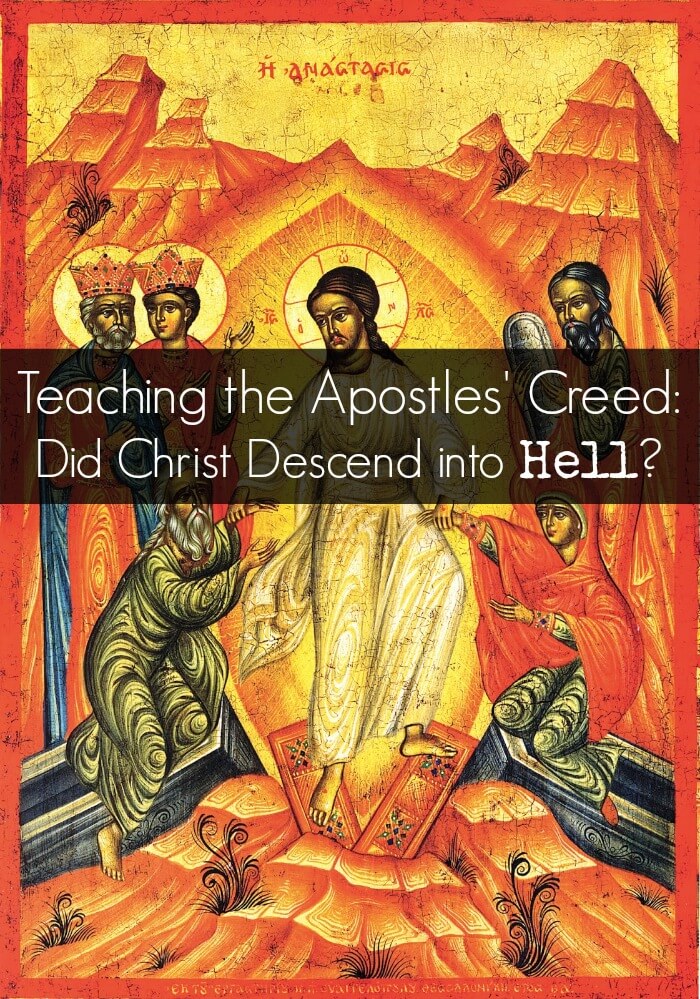In the coming school year, our aim is to have our children memorize the Apostles’ Creed as we study it together as a family. This ancient creed is one of the most widely used statements of faith in the church today, and the substance of it goes back to the early centuries of the church. We think studying this will be very beneficial for our kids and our whole family for many reasons. (Read our post, “5 Reasons to Teach Kids the Apostles’ Creed“).
When we released our Apostles’ Creed handwriting curriculum, we heard from several parents who expressed concern about the controversial phrase in the Creed, “he descended into hell.” What does this mean? Is it even true?

Common Misunderstandings
First, it is helpful to clear the air about by acknowledging that we need to interpret the word “hell” correctly. When the Apostles’ Creed was translated into English (say, for example, in the Book of Common Prayer), “hell” had a slightly different connotation than it does now. In the seventeenth century, hell was thought of as the underworld or the realm of the dead, not necessarily just a place of torment or punishment. Some modern translations of the Creed prefer, “he descended to the dead.”
“Hell” is a translation of the Latin inferna, which is a reference to the underworld generally. A correlating Greek term might be “hades.”
There are some who believe falsely that the Apostles’ Creed is teaching that Christ descended into hell after his death in order to suffer more for our sins. But this is neither supported by Scripture nor by any commentator in the ancient church who helped to pen and promote the Apostles’ Creed.
2 Critical Questions to Answer
In my exploration of this topic, there are two important overarching questions.
- Does the Bible teach this doctrine, and if so, what does the Bible teach about it?
- What did the early church mean by the inclusion of Christ’s descent in the Creed?
Where the answers to these questions overlap, we will find our answer.
Both concerns are important for interpreting this phrase in the Creed. Some, in an effort to be faithful to the early church fathers, embrace anything and everything they had to say about Christ’s descent without criticism, ignoring their potential misinterpretations of the Bible. If we are going to believe the doctrine, the Bible should be our sole source of revelation about it.
Others, in an effort to be faithful to the Scriptures, try to make the phrase in the Creed mean something the church fathers never intended it to mean. If we are going to confess this line of the Creed, we should do so in harmony with the theologians who helped to compose it.
6 Biblical Passages to Consider
There are several texts that are often used to defend the idea of Christ’s descent after his death. Below are some critical questions we should be asking if we are going to come to a conclusion.
- When Christ said after he died he would spend three days in “the heart of the earth” (Matthew 12:39-40), was he talking about his body being in a rock-cut tomb, or was he talking about his soul being in the deepest earthly regions, in the underworld below?
- When Paul asks, “Who will descend to the abyss (that is, to bring Christ up from the dead)?” (Romans 10:6-7) was he speaking hyperbolically, saying that no one needs to descend to the deepest depths to find Christ, or was he reflecting an early church tradition that taught that Christ indeed descended into the deep realms of hades?
- When Peter said Jesus was loosed from the “pangs of death” and that Christ’s soul was not abandoned in Hades (Acts 2:24,27), is he merely talking about Christ’s physical resurrection, or is he also talking about Christ’s soul no longer being hades, in the realm of the dead?
- When Paul says Christ descended to the “lower regions” (Ephesians 4:9-10) is he talking about Christ’s incarnation and descent from heaven to earth, or is he talking about Christ’s descent to the earthly lowest regions of the earth, to hades below?
- When Christ promised the criminal on the cross that on that very day they would both be in paradise (Luke 23:43), was he referring to heaven, or was he referring to a realm in or near hades reserved for the saints?
- When Peter says Christ preached to “the spirits in prison” (1 Peter 3:18-20), is he talking about something Christ did between his death and resurrection, something Christ did after his resurrection, or something the Spirit of Christ did long ago through God’s prophets?
Keep in mind, one need not believe all of these passages point to Christ’s descent in order to believe in the doctrine.
How I Will Explain This to My Kids
This is a topic I’m still exploring personally. Perhaps some day I will write another post with my conclusions, but for now I’m still narrowing in on what I believe.
For the time being, I plan on teaching my kids to memorize and recite the Apostles’ Creed, and when it comes to the doctrine of Christ’s descent, I’m going to focus on several important truths:
- At Christ’s death, his terrible sufferings were over (John 19:30).
- When Christ died on the cross, he experienced a true and complete death: his soul was separated from his body (Luke 23:46). When we say, “he descended into hell,” the first thing we mean is that Christ’s soul entered the realm of the dead.
- We know Christ went to Paradise after He died (Luke 23:43). There he enjoyed rest from his sufferings and the presence of saints who came before him.
As for some of the other questions about Christ’s descent, I plan on working through each of the above questions, one by one, and sharing my findings with my kids (especially my oldest son). I want them to see the process of doing theology, asking the hard questions.
Study Tools to Help You
Perhaps this is something you wish to study for yourself. If so, I’ve compiled a number of resources, all coming from different positions.
First, to get an overview of the subject, listen to a teaching I gave at my church where I introduce the topic and the key texts:
Second, below are some scholarly articles you might find helpful, all coming from different positions:
- “Christ ‘Descended into Hell’” by John Calvin – Taken from his Institutes of the Christian Religion, Calvin defends the notion that Christ’s descent into hell is referring to his hellish torments on the cross.
- “In Defense of the Descendit: A Confessional Response to Contemporary Critics of Christ’s Descent into Hell” by Daniel R. Hyde – This article appeared in the The Confessional Presbyterian, defending the two classic Reformed views of the phrase.
- “He Did Descend to Hell: In Defense of the Apostles’ Creed” by David P. Scaer – This article appeared in the Journal of the Evangelical Theological Society, defending the classic Lutheran position.
- “He Descended into Hell” by J.I. Packer – This is a short chapter from Packer’s book Affirming the Apostles’ Creed, where he explains the notion that Christ descended into hades to perfect Old Testament believers.
- “The Descent to Hell” by J.N.D. Kelly – This is an excerpt from Kelly’s Early Christian Creeds where he explains the origin of the phrase in the Apostles’ Creed against the backdrop of early church writings.
- “He Descended into Hell: Creed, Article, and Scripture” by John Yates – This article appeared in the Churchman, where Yates defends a modified Anglican position.
- “He Descended into Hell” by Lee Irons – This is a personal position paper defends the notion that Christ’s soul descended into hades, offering some explanation about his activity there.
- “He Did Not Descend into Hell: A Plea for Following Scripture Instead of the Apostles’ Creed“ by Wayne Grudem – This position paper appeared in the Journal of the Evangelical Theological Society, denying the doctrine of Christ’s descent and proposing that the line be stricken from the Creed altogether.
I hope these resources are a help to you as you explore these questions.
What do you think? Do you confess this line of the Creed? If so, what do you think it means?
 Teach Your Kids the Apostles’ Creed: A New Family Bible Study
Teach Your Kids the Apostles’ Creed: A New Family Bible Study
Check out our family Bible study: Laying the Foundation: A Family Study of the Apostles’ Creed. It includes 30 devotional lessons to teach your children the Creed, line by line, thought by thought.
Also, as a part of our Write Through the Bible series, we have both manuscript and cursive versions of the Apostles’ Creed handwriting workbooks.
You can get all of these resources in our Apostles’ Creed Family Bundle.











I was taught that Jesus went to hell to get the OT believers growing up. I wasn’t aware of the Creed or the controversy surrounding it. Hmm, I’ll have to read up on it some more.
Yes, LaToya, that is one of the views people take. It is fairly common in evangelical circles, but others believe that when Jesus said he would be going to Paradise, He meant heaven, not hades. There are several passages of Scripture to wrestle with. Listen to my presentation embedded on this post to get a bird’s eye view of the issue.
Hmm, ok I guess I was taught both them. That he went and got the OT folks during the time he was dead and then went to Heaven. I’m going to watch that clip tonight once my boys are in bed because now I’m curious.
You have some very nice icons here. As an Orthodox Christian, I find it stunning that there is controversy over this article of faith, that is in fact at the very heart of the Gospel. What IS the good news except that Christ descended into Hades (yes, a much better translation) to release the captives (captive to death, the wages of sin to which all men were subject) and to ascend with them into Paradise, being the Firstborn among the dead!?! He opened the gates of Paradise which had been closed at the Fall and brought those souls out of the prison of death into Eternal Life. That is why it’s good news! We no longer have to fear death as the end of the story- Christ has “trampled down death by (His) death” and set us free from the chains that bound us there (because of sin) and opened the way to re-enter Paradise! That is some very Good News.
Incidentally, the first image you show there tells exactly what this doctrine is about- Christ is standing on the broken doors of Hades, lifting Adam and Eve from their tombs with the OT kings and prophets standing by Him, also ready to follow Him up into Paradise. In most icons of the Resurrection like this, you can also clearly see John the Baptist who is pointing toward Christ and holding out a scroll with his message as the Forerunner- going ahead of Christ (into Hades/death) to declare the good news to all the souls there awaiting His arrival. It’s truly an awesome teaching, and as ancient a teaching as the Resurrection itself!
If you would like to know more about it, simply google “Orthodox understanding of salvation” or something to that effect and you’ll find plenty of sources that explain what has been a universal Christian teaching…until relatively recently anyways.
Please forgive me for such a long post- I don’t normally do this, but -this is important stuff!
Thanks for your thoughts, Anastasia. Yes, this is a contested doctrine today, and one that many would say is not only not at the heart of the gospel, but not in Scripture at all.
Now, bear in mind, those who believe this also completely agree that Jesus conquered sin and death, but they don’t believe He did that by a descent into hell, but simply in his atoning death and physical resurrection. They see no warrant for the belief that the saints before Christ descended into hades, nor any warrant that Christ went there to join them.
If you listen to the video you’ll hear me explain there were actually two pervasive views in the early church about Christ’s descent. Theologians differed on the exact reason for the descent.
PS: I love Athanasius. He is one of my favorite early church fathers. I wrote a post about the Nicene Creed a while back mentioning him.
Oh, or better yet, read St. Athanasias, On the Incarnation. It’s easy to read, as theology goes. He was instrumental in formulating the Nicene Creed and he happens to be the first to put into writing the exact list of books that we use today as canonical Scripture…so you can trust him 🙂
I can see this is an important point to you as well, with all the research you’ve done. I’m glad to see you have included a wide reading of the early Church fathers in your work. Perhaps it is enough to trust that the same Christians (martyrs, confessors and truly virtuous men) who preserved and canonized the written record of our faith (the Bible) did not invent stories about Christ’s saving work (or any of the other “controversial” ancient and orthodox teachings still held today), but were faithful to “the faith that was delivered once and for all to the saints” (whether by word or by epistle).
Rather than try to fit God into our reasonable, but ultimately, man-made theological box, we could simply accept the mystery of salvation and join in with what Christians have been praying, singing and believing for 2 millenia:
In the grave bodily, in hades with the soul as God, in Paradise with the thief, and on the throne with the Father and the Spirit wast Thou Who fillest all things, O Christ the Uncircumscribable.
Christ is risen from the dead, trampling down death by death and upon those in the tombs bestowing life!
Again, forgive me. I shouldn’t be writing anything at this late hour- let alone apologetics. God bless you on your journey and thank you again for the work you and your wife do online.
I know I’m commenting long after this first posted. I have been saved for 10 years now and the longer I’m saved the more I learn just why there is so many different Christian denominations. I was looking at Christian colleges and their statements of faith when I first came across the belief that Jesus spent 3 days in hell. I was floored as I’ve read the Bible through more than once and I had never been lead to that understanding. My husband asked,” How does it make you feel if he spent 3 days in hell?” My answer is that it would make me love him even more. My Pastor says it’s heresey. He is a fundamental baptist preacher and teaches the Bible VERY well. Just the same, I’m glad for all the you’ve presented here as I’m after truth and do plan to study this. I just wanted to point out that the OT prophesized every aspect of Jesus’ life and death. Is there any prophecy to back up that Jesus descended into hell. Also, Jesus’ blood on the mercy seat is what makes an atonement for our sins, not his sufferings. Did the animal sacrifices have to suffer to atone for sins or just their blood? Their bodies were burned after the animals were dead. I intend to find out and just may bring my children on this journey that is presented to show how to study for ourselves with the Holy Spirit as the guide and not rely on what others say. I realize now how important it is to know what you believe and why. I may not know all the answers for my children, but I KNOW JESUS PAID FOR MY SINS! AMEN! That’s the most important lesson. Thank you again for all these resources.
Hey Stacy,
I think it’s important to remember that Christ’s descent into hell, when it was taught in the early church, was not a descent for further suffering. It was either (a) simply a way of saying that Christ really died (his soul separated from his body), or (b) it was a descent of victory, bringing the saints who came before him into paradise. The notion that Christ suffered further in hell is a very new theological concept, and that was not the intent of that phrase in the Creed.